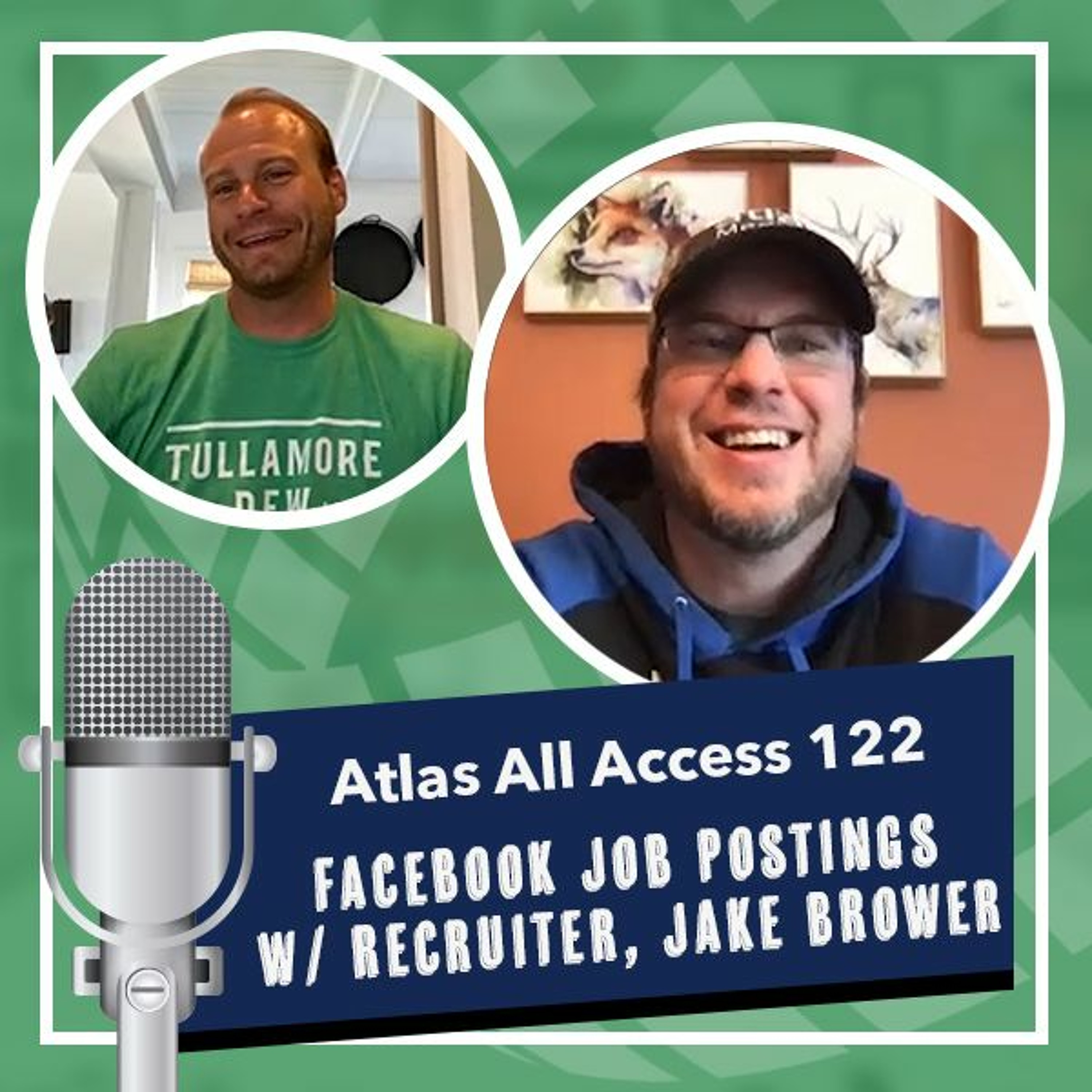
Facebook travel nurse jobs with Travel Nurse Recruiter Jake Brower - Atlas All Access 122
06-18-2020
That amazing job you saw posted on Facebook? The one you think is too good to be true? It probably is.
But how can a travel nurse or healthcare pro know? How do you spot the fake posts from the real ones?
Join us for an in-depth conversation with Nurse Recruiter Jake Brower and Atlas MedStaff Vice President Rich Smith, as we get right to the heart of the matter. Nothing is left on the table as we dissect the realities behind all those job posts you see on Facebook. What do they mean, and what are those recruiters really trying to do?
The best defense against janky job posts on social media? Build a relationship with a recruiter you can trust.
Your recruiter should be ok with you sending them a job post you see in the wild, both to ask if it's one they can get for you, and also to trust them enough when they tell you it's likely BS (that's the technical industry term).
Get to know Nurse Recruiter Jake Brower:
>> https://atlasmedstaff.com/atlas-team/jake-brower/
Rich Smith: So still doing the quarantine thing. Recruiter Jake Brower joins us today. We're going to talk about jobs on Facebook because it seems like, I mean, it seems like they've been here forever. They really haven't. It's just a phenomenon that started within the past couple of years. We're going to work through maybe what's real? What's not? Is it official? Is it not? From a recruiter standpoint, I think it's going to be a very interesting conversation that would translate over to all of our traveling healthcare professionals. Atlas All Access at home starts now.
Rich Smith: All right. Jake, I miss you brother.
Jake Brower: Yeah. No kidding.
Rich Smith: I hope to get back soon, but I don't know. We'll see. We'll see how it goes.
Jake Brower: I mean that's the beauty of our job though. We can do it from anywhere. I mean that's kind of almost a privilege on our part just to be able to continue to support, because nurses can't work from home.
Rich Smith: Right. That's a fine line too that we have to, especially on my end, that I have to kind of walk. We all work from home. They can't or whatever, but we're doing our part to try to stop, to flatten that curve. We haven't talked about that for a while, but flatten the curve as much as we can.
Jake Brower: There's some benefits. I mean you don't know if I have my pajamas on under this T-shirt or not [inaudible 00:01:45].
Rich Smith: Do I want to know [inaudible 00:01:47].
Jake Brower: Exactly.
Rich Smith: You sent me an email, I thought it was interesting. Let's talk through some of these points. Especially when it comes to Facebook jobs, job posting sounds very official, right? Job post, this is an open job and it's on a forum that anybody can access. Everybody does access it for the most part. It sounds like a very real official thing. Is it?
Jake Brower: Yeah. Yeah. I mean, when I emailed you last night, I had just gotten a text from a nurse with a screenshot of a picture that a recruiter had posted a job on Facebook and was discussing said job with their recruiter in the feed. Somebody jumped in and made the sentence like, "Oh, this job has postings for $400 more a week." I think what sort of jumped out at me is the fact that the way this nurse was discussing the job, the posting, it sounded like a very official formal thing, reliable, you can count on it, "Hey, this is a job that's real. It's legit. The pay is legit. It's posted."
Jake Brower: I think that word posting jumped out at me because, at the end of the day, Facebook has become probably the most convenient place to figure out details about jobs. There aren't very many companies that have a really good platform for a nurse to go to and find all the jobs, not to mention different agencies have different contracts, different jobs. It's sort of become like a, "Hey, let's just share everything and I'll be able to find what I need."
Rich Smith: It's one of those scenarios where that's where the audience is, and so that's where I'm going to share that. I think the part that stuck with me when I read that first part of your email was you're right, job post has a completely different context now than maybe it did seven to 10 years ago. Seven to 10 years ago it was companies, like us, would pay for a slot on some of those major job boards, Monster, CareerBuilder, places like that, so we had to pay for it. You're paying actual dollars for that job posting, so you better hope that it's real. It better be real because, otherwise, I mean you're just wasting money. This is it's free, right? You can do whatever you want there.
Jake Brower: Yeah. Ultimately, there's accountability connected to websites like that. You can't post fake jobs or somebody is going to find out and you're going to get your stuff pulled and, at the same time, you're wasting your money. It just occurred to me that it's a relevant question for nurses. How much stock can I put in Facebook? As a nurse, if you're watching this, ask yourself, what are your perspectives about Facebook? How much do you feel like you can trust the job postings you see on different job boards, like Premium Job Board or [inaudible 00:04:59] job board, there's just so many out there. Ask yourself how reliant have you become on those and what has been your experience in the past with finding jobs there and, ultimately, seeing that they match and come to fruition with the original posts that you saw. How helpful are they?
Rich Smith: Yeah. It'd be interesting to understand or to know maybe from a traveler if they saw a job post, they responded to it, they submitted their profile and then actually got that job.
Jake Brower: That job.
Rich Smith: That one in particular, yeah.
Jake Brower: Right. Would be fascinating, but that's part of the issue. There's no way to know that for sure. We can't quantify it. That's why I think this conversation is important because so many nurses and the industry as a whole has become very dependent on Facebook, in particular, for finding, pitching, matching nurses to jobs.
Rich Smith: I mean a lot of our targeted audience, nurses, traveling healthcare professionals, are probably watching this very thing on Facebook right now. We're just as guilty as everyone else of putting our information onto that platform. One, because it's free. Two, because we know the audience is there. It begs the question are job posts on Facebook real?
Jake Brower: Are you asking?
Rich Smith: I kind of am, yeah.
Jake Brower: I think in a lot of ways you can only really know this from experience, and that's why I ask the question to nurses, what have you seen? How have you seen those job postings be effective at helping you get a job but, more specifically, the job that is being posted? I believe, with everything that I am, the recruiters at Atlas are doing their very best to put accurate, helpful information on Facebook so that nurses can find those jobs. We can match those jobs ultimately so that we can help our vendor partners fill important needs. I can't unequivocally say that that's true across the board. I definitely can't say it about the industry as a whole.
Jake Brower: What I do know is there's multiple motivations for posting jobs, right? One would be to get a placement, right? As recruiters, it's our job to get placements. We get paid when we get placements, let's not make... We don't need to pretend about that. A recruiter is going to post a job hoping that the right nurse comes along and they can get their information, submit them, and they get that job. That would be an ideal scenario, right?
Jake Brower: There's other motivations for posting jobs on Facebook. I think that probably the number one motivation, and you can correct me or maybe it's too extreme, I believe, for the most part, Facebook job postings are as least as much about marketing the recruiter as the job itself. If I post a job, there's at least a huge part of why I'm posting that is to get nurses to see me, connect with me, want to work with me. Whether it's because they like the graphic or the job fit and it's the spark for a relationship or the pay package was nice, it entices a nurse to pick up the phone and call me. Hey, I've got information on my desk. Now I can get them, if not that job, a job. At the end of the day, that's really what I'm after as a recruiter.
Rich Smith: You brought this up, so this is like the pros and cons of posting those jobs on Facebook. I think that's definitely a pro. I think, at least on the recruiter side, it is a pro. I think it could be a pro on the traveler side as well.
Jake Brower: For sure.
Rich Smith: Because it really has... The industry has changed so much. I talked about it the other day. Before it was just how many times can you dial the phone and get that person on the phone? Now, it's almost the other way around. They recognize your name hopefully, or they've seen your job posts before, or whatever.
Jake Brower: Right. Yeah. Recruiters are branding themselves essentially, and you can do that on Facebook because there's such heavy traffic. Recruiters who have done it well at Atlas, they're probably names that anybody who's active on Facebook as a nurse recognizes, recognizes their graphic, recognizes their name, their hashtag, whatever. That's become such a huge part of the Facebook culture. I'm not a nurse, I don't know for sure, but I would imagine that that does bring a lot of traffic to recruiters that are doing it well.
Rich Smith: Then, in your opinion, what are some of the cons? What are the drawbacks?
Jake Brower: For a recruiter specifically?
Rich Smith: Sure. Yeah.
Jake Brower: I have a hard time seeing a context where there's no temptation to misuse it with potentially good motives, bait and switch. I mean I've talked to a million different travelers who have kind of talked about that, like, "The job was up, it was posted on Facebook. I reached out to that recruiter, got them all of my information. As soon as it was done, what do you know? The job is closed, but let's find you something else." Smart, I don't know. Honest, probably not. I think that's one of the potential cons of it is is it really something that you can count on? If it's not, then what does that do? What does that do to every other posting?
Jake Brower: I think part of my sort of message today is to help nurses understand it's helpful. It's useful. It creates avenues for connecting with people, recruiters that you might end up having a great relationship with. That being said, I think it's dangerous to view it as anything other than a tool to help kind of network with people. If you're relying on it solely to find your jobs, you might find yourself really, really frustrated.
Rich Smith: Then, your last bullet point was, I think this was maybe the most interesting of all, in general, what should a traveling healthcare professional of any experience level know about the role of social media and job postings?
Jake Brower: Sure. I think, first and foremost, it's important for every nurse to understand that there's nothing formal or official about a Facebook post. Companies don't put out Facebook posts, individual recruiters do. I've run into a scenario before where I got two different screenshots, both Atlas recruiters, same job, different pay packages. If that doesn't tell you how ultimately unreliable Facebook pay packages are, then I don't know what does, right? Every individual recruiter has pretty much free rein to post anything they want and to use it however they want. As a nurse, it's important for you to understand that when you see a Facebook post, you should always take it with a grain of salt.
Jake Brower: Ultimately, my hope for every single nurse is that they find a recruiter, at least one, that they would never question their motives. They would never question their honesty. They can take a Facebook pay package to them and say, "Hey, I saw this on Facebook," and feel like they're going to shoot straight with them. Whether it's like, "Hey, I'm not really sure..." I had this happen just today, an OR job in Virginia Beach that pays 3,000 a week for 36 hours. I'm just like, "That's not real, that does not exist. It's not in our system. The hospital is a hospital we have. Sure, vendors could be holding it back, but still in Virginia, we just don't see rates like that. We just don't and we never have."
Jake Brower: I think having a really good recruiter that you trust that has information like that, you can navigate that together, "Hey, send me the job posting. Let's talk about it. Let's talk about the other jobs in the area. Let's talk about average rates for the area. Does this feel like it fits?" That ultimately leads to the question if it feels suspicious, why? What am I dealing with? What are the realities? What can I learn about the market from a fake Facebook post or even a real one? What happened right there? Why don't you have this job and another company does?
Jake Brower: It is helpful for learning as long as you have somebody who's willing to really help you. I think that at Atlas, we pride ourselves on having recruiters that are knowledgeable and really honest and transparent and want to have those kinds of conversations. I'm never going to be mad at a nurse for sending me a pay package even if it feels like it's not realistic, but I'm also ready to say, "Hey, I don't think that's realistic. Let's talk about why."
Rich Smith: Right. You are comfortable enough to do that. I wonder is that happening across the board? I don't know. We've also got a culture that we've created where another recruiter at Atlas could send that pay package to you and say, "Does this look right?" That kind of open conversation happens a lot. I see it happen a lot.
Jake Brower: Yeah. I mean one of the things that I think is probably most frustrating for nurses is not understanding the reality that every single recruiter has a lot of wiggle room. Every company is structured really, really differently. There's this mentality or mindset out there that if there's one job and there's multiple postings for the same job, let's say there's three companies, A, B, and C and company A has the highest pay package, company B is in the middle, and company C is super low, that company C is automatically bad. They're low balling. They're wrong. They're lying. They're trying to take advantage of nurses.
Jake Brower: The reality is if we're willing to have honest conversations, maybe company C just has a different business model. Maybe company A is posturing to sell and they're just trying to get as many nurses on their desk as possible, so they don't care if they can actually pay that nurse in two weeks. They just want to get that deal on their desk. It's, in a lot of ways, frightening to have these conversations and for a nurse to go, "Well, how do I know who to trust and when to trust them?" I think that that's why the nurse-recruiter relationship is so incredibly paramount. In an industry that's increasing its technology driven tools, I think that the ultimate answer to so much of this is really building genuine relationships that are trusting. If you can do that, then it's easier to navigate some of this stuff.
Rich Smith: Right. I think that's what it really comes down to. In the end, after I read your email and I sat on it for a little bit and I thought, I think deep down you know the answer to this, the answer to this is what you just said, it's building that relationship first. This isn't a transactional industry. Now, it was. At one point, it really was, but it's not anymore. When it really was just how many times can I push the buttons on the phone, right? It was like that. It's not that way anymore. They know you as a recruiter on a very personal level. They know your daughter was just dancing behind you as you were talking right there, but they know that.
Rich Smith: They know your family. The ones that you work with know your family, and that is your safeguard, I think. That's the fail safe. They can still send the email to you and say, "Jake, does this look right?" They're comfortable with you saying, "Yeah, it does. Or no, it does not. You should not... This is not correct," and be able to show them like, "Okay, this is what we're looking at and it's just not there."
Jake Brower: Right. I think in a perfect world, us, as recruiters, would do such a good job at helping to really empower and educate the nurses that we work with that they'd come across pay packages like that and go... Their first thought is I don't think that's right. That, in and of itself, can build some trust. Right? My recruiter doesn't just expect me to follow blindly. My recruiter wants me to understand, is okay with me doubting and questioning and wondering because there's so much information out there. Yeah. I mean I've told multiple nurses, "Hey, if you can get that for that job, take it, go for it." I mean, ultimately, the major concern that I would have is is that going to actually come to fruition or is that kind of a bait and switch?
Jake Brower: Is it something that maybe they're going to skim something off later or there's going to be a hidden cost that they're not showing you upfront? Or are they going to be able to make payroll? Let's be honest, this industry is a business, right? If nurses understand this, if your company isn't making money, you're not going to get paid. That's a simple reality. This idea that companies that are in it for the money are bad is also a problematic understanding of the industry, right? If your company is doing well, celebrate that because that means you have job security. That means your paycheck is going to arrive.
Jake Brower: That means that if something's wrong with your paycheck, it's going to get fixed ASAP and there's nothing funny going on behind the scenes. I know we've sort of sidetracked a little bit, but in a world, in a Facebook driven industry that doesn't have a whole lot of accountability, it's really helpful to know you can count on your company to navigate all of the different kinds of crazy things that you see.
Rich Smith: Like I said, in the end, that's the answer. That was the answer to your email and those questions right there. Being able to talk about it in an open forum isn't something that we need to do often, right? You and I have had this conversation. We've had similar conversations to this in this exact, well, in Omaha.
Jake Brower: In the office.
Rich Smith: I can see you right there and whatever, but we've had these conversations before and it's important to continue to have these conversations because the world's different now and it will continue to evolve. Our job, your job, my job, the nurse's job will continue to evolve as well.
Jake Brower: Right. Yeah, for sure. For sure. I think just the biggest thing for nurses as you consider this and how you use Facebook, use it. It's helpful in so many ways. There really is a speed of information that you can get from Facebook that you can't really get anywhere else. I mean that's the reality when a nurse texts me and says, "Hey, I'm looking for an ICU job. Can you help?" I'm going to get her everything I have, but there's really nowhere for that nurse to go and just find all the jobs and all the information. It can be helpful from that standpoint, but, one, don't get sucked into believing that everything you read on Facebook from a job standpoint is legit. It's not.
Jake Brower: I don't know what the percentage is. I couldn't even guess. Don't forget that at least half of the reason why a recruiter is posting on Facebook a job is to market themselves. That's not a bad thing, but that doesn't necessarily mean that the job information is going to be as helpful as you want it to be. It may not be their main motivation for posting.
Jake Brower: Number three, if you have a solid recruiter that you trust, go ahead and troll Facebook, send stuff back to your recruiter, ask them to help you kind of like navigate through it, figure out what's good, what's not, and it can really be a helpful tool if you kind of go at it together as a partnership and helping you find what's available. The truth is I have one nurse that got a job because she saw a Facebook post. We didn't have the job yet.
Jake Brower: I contacted my client manager for that position, said, "Hey, can you get this for me?" Two days later, she had an offer. If you work together, it can be really, really helpful and [inaudible 00:21:50] isn't a problem as long as you [inaudible 00:21:54] where that information is coming from and how to use it to your best interests and not just kind of follow blindly.
Rich Smith: That wraps it up better than I possibly could. There you go. Jake, I appreciate your knowledge, man. Anytime you want, you send me those emails and we'll have those conversations right here.
Jake Brower: Sweet. Sounds good. I appreciate it.
Rich Smith: All right, man. Hopefully I see you soon in person.
Jake Brower: Will do, definitely.
Rich Smith: All right.
Jake Brower: Talk to you soon.
Rich Smith: We'll see you next week.
Jake Brower: Yeah.



